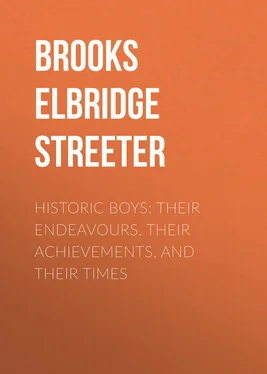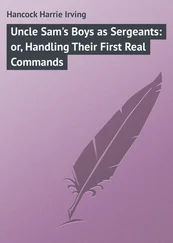Elbridge Brooks - Historic Boys - Their Endeavours, Their Achievements, and Their Times
Здесь есть возможность читать онлайн «Elbridge Brooks - Historic Boys - Their Endeavours, Their Achievements, and Their Times» — ознакомительный отрывок электронной книги совершенно бесплатно, а после прочтения отрывка купить полную версию. В некоторых случаях можно слушать аудио, скачать через торрент в формате fb2 и присутствует краткое содержание. ISBN: , Жанр: foreign_antique, foreign_prose, Биографии и Мемуары, на английском языке. Описание произведения, (предисловие) а так же отзывы посетителей доступны на портале библиотеки ЛибКат.
- Название:Historic Boys: Their Endeavours, Their Achievements, and Their Times
- Автор:
- Жанр:
- Год:неизвестен
- ISBN:http://www.gutenberg.org/ebooks/27157
- Рейтинг книги:3 / 5. Голосов: 1
-
Избранное:Добавить в избранное
- Отзывы:
-
Ваша оценка:
- 60
- 1
- 2
- 3
- 4
- 5
Historic Boys: Their Endeavours, Their Achievements, and Their Times: краткое содержание, описание и аннотация
Предлагаем к чтению аннотацию, описание, краткое содержание или предисловие (зависит от того, что написал сам автор книги «Historic Boys: Their Endeavours, Their Achievements, and Their Times»). Если вы не нашли необходимую информацию о книге — напишите в комментариях, мы постараемся отыскать её.
Historic Boys: Their Endeavours, Their Achievements, and Their Times — читать онлайн ознакомительный отрывок
Ниже представлен текст книги, разбитый по страницам. Система сохранения места последней прочитанной страницы, позволяет с удобством читать онлайн бесплатно книгу «Historic Boys: Their Endeavours, Their Achievements, and Their Times», без необходимости каждый раз заново искать на чём Вы остановились. Поставьте закладку, и сможете в любой момент перейти на страницу, на которой закончили чтение.
Интервал:
Закладка:
There is a stir of expectation; a burst of trumpets from the Capitol; and all along the Sacred Street and through the crowded Forum goes up the shout, "Here they come!" With the flutes playing merrily, with swaying standards and sacred statues gleaming in silver and gold, with proud young cadets on horse and on foot, with priests in their robes and guards with crested helms, with strange and marvellous beasts led by burly keepers, with a long string of skilled performers, restless horses, and gleaming chariots, through the Forum and down the Sacred Street winds the long procession, led by the boy magistrate, Marcus of Rome, the favorite of the Emperor. A golden chaplet, wrought in crusted leaves, circles his head; a purple toga drapes his trim, young figure; while the flutes and trumpets play their loudest before him, and the stout guards march at the heels of his bright-bay pony. So into the great circus passes the long procession, and as it files into the arena, two hundred thousand excited people – think, boys, of a circus-tent that holds two hundred thousand people! – rise to their feet and welcome it with hearty hand-clapping. The trumpets sound the prelude, the young magistrate (standing in his suggestus , or state box) flings the mappa , or white flag, into the course as the signal for the start; and, as a ringing shout goes up, four glittering chariots, rich in their decorations of gold and polished ivory, and each drawn by four plunging horses, burst from their arched stalls and dash around the track. Green, blue, red, white – the colors of the drivers stream from their tunics. Around and around they go. Now one and now another is ahead. The people strain and cheer, and many a wager is laid as to the victor. Another shout! The red chariot, turning too sharply, grates against the meta , or short pillar that stands at the upper end of the track, guarding the low central wall; the horses rear and plunge, the driver struggles manfully to control them, but all in vain; over goes the chariot, while the now maddened horses dash wildly on until checked by mounted attendants and led off to their stalls. "Blue! blue!" "Green! green!" rise the varying shouts, as the contending chariots still struggle for the lead. White is far behind. Now comes the seventh or final round. Blue leads! No, green is ahead! Down the home stretch they go in a magnificent dash, neck and neck, and then the cheer of victory is heard, as, with a final spurt the green rider strikes the white cord first and the race is won!
And there, where the race is fiercest and the excitement most intense, sits the staid young Marcus, unmoved, unexcited, busy with his ivory tablets and his own high thoughts! For this wise young Stoic, true to his accepted philosophy, had mastered even the love of excitement – think of that, you circus-loving boys! He has left it on record that, even as a youth, he had learned "to be neither of the green nor of the blue party at the games in the circus," and while he looked upon such shows as dangerous and wasteful (for in those days they cost the state immense sums), he felt, still, that the people enjoyed them, and he said simply: "We cannot make men as we would have them; we must bear with them as they are and make the best of them we can." And so it happened that at this splendid race at which, to please the people, he presided as magistrate, this boy of sixteen sat probably the only unmoved spectator in that whole vast amphitheatre.
Now, in the interval between the races, come the athletic sports; foot-racing and wrestling, rope-dancing and high leaping, quoit-throwing and javelin matches. One man runs a race with a fleet Cappadocian horse; another expert rider drives two bare-backed horses twice around the track, leaping from back to back as the horses dash around. Can you see any very great difference between the circus performance of A. D. 138 and one of A. D. 1886?
Among the throng of "artistes" on that far-off March day there came a bright little fellow of ten or eleven years, a rope-dancer and a favorite with the crowd. Light and agile, he trips along the slender rope that stretches high above the arena. Right before the magistrate's box the boy poises in mid air, and even the thoughtful young director of the games looks up at the graceful motions of the boy. Hark! a warning shout goes up; now, another; the poor little rope-dancer, anxious to find favor in the eyes of the young noble, over-exerts himself, loses his balance on the dizzy rope, and, toppling over, falls with a cruel thud to the ground, and lies there before the great state box with a broken neck – dead. Marcus hears the shout, he sees the falling boy. Vaulting from his canopied box he leaps down into the arena, and so tender is he of others, Stoic though he be, that he has the poor rope-dancer's head in his lap even before the attendants can reach him. But no life remains in that bruised little body, and, as Marcus tenderly resigns the dead gymnast to the less sympathetic slaves, he commands that ever after a bed shall be laid beneath the rope as a protection against such fatal falls. This became the rule; and, when next you see the safety-net spread beneath the rope-walkers, the trapeze performers, and those who perform similar "terrific" feats, remember that its use dates back to the humane order of Marcus, the boy magistrate, seventeen centuries ago.
But, in those old days, the people had to be amused – whatever happened. Human life was held too cheaply for a whole festival to be stopped because a little boy was killed, and so the sports went on. Athletes and gymnasts did their best to excel; amidst wild excitement the chariots whirled around and around the course, and then the arena was cleared for the final act – the wild beast hunt.
The wary keepers raise the stout gratings before the dens and cages, and the wild animals, freed from their prisons, rush into the great open space, blink stupidly in the glaring light, and then with roar and growl echo the shouts of the spectators. Here are great lions from Numidia and tigers from far Arabia, wolves from the Apennines and bears from Libya, not caged and half-tamed as we see them now, but wild and fierce, loose in the arena. Now the hunters swarm in, on horse and on foot, – trained and supple Thracian gladiators, skilled Gætulian hunters, with archers, and spearmen, and net-throwers. All around the great arena rages the cruel fight. Here, a lion stands at bay; there, a tigress crouches for the spring; a snarling wolf snaps at a keen-eyed Thracian, or a bear with ungainly trot shambles away from the spear of his persecutor. Eager and watchful the hunters shoot and thrust, while the vast audience, more eager, more relentless, more brutal than beast or hunter, applaud and shout and cheer. But the young magistrate, who had, through all his life, a marked distaste for such cruel sport, turns from the arena, and, again taking out his tablets, busies himself with his writing, unmoved by the contest and carnage before him.
The last hunted beast lies dead in the arena; the last valorous hunter has been honored with his palma , or reward, as victor; the slaves stand ready with hook and rope to drag off the slaughtered animals; the great crowd pours out of the vast three-storied building; the shops in the porticos are noisy with the talk of buyers and sellers; the boy magistrate and his escort pass through the waiting throng; and the Festival Games are over. But, ere young Marcus reaches the Forum on his return, a shout goes up from the people, and, just before the beautiful temple of the Twin Gods, Castor and Pollux, where the throng is densest, flowers and wreaths are thrown beneath his pony's feet, and a storm of voices raises the shout:
" Ave Imperator! Ave Cæsar! "
"What means that shout, Aufidius?" he asked his friend, who rode in the escort. But the only reply Aufidius made was to join his voice with that of the enthusiastic throng in a second shout; " Ave Imperator! Auguste, Dii te servent! " (Hail, O Emperor! The gods save your majesty!)
Читать дальшеИнтервал:
Закладка:
Похожие книги на «Historic Boys: Their Endeavours, Their Achievements, and Their Times»
Представляем Вашему вниманию похожие книги на «Historic Boys: Their Endeavours, Their Achievements, and Their Times» списком для выбора. Мы отобрали схожую по названию и смыслу литературу в надежде предоставить читателям больше вариантов отыскать новые, интересные, ещё непрочитанные произведения.
Обсуждение, отзывы о книге «Historic Boys: Their Endeavours, Their Achievements, and Their Times» и просто собственные мнения читателей. Оставьте ваши комментарии, напишите, что Вы думаете о произведении, его смысле или главных героях. Укажите что конкретно понравилось, а что нет, и почему Вы так считаете.












